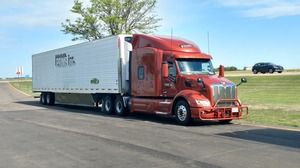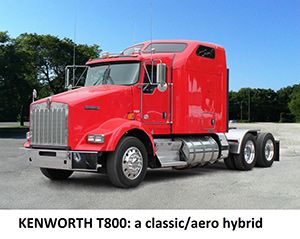Hello From Tacoma!
Topic 19571 | Page 1

Oscar,
I was born/raised just down the highway from you in Toledo WA.
Because of the nature of our site here at TruckingTruth, we usually stay away from the Owner/Op or Lease/Op aspects of this career.
My best advise is to check around with some of the log truck folks that are quite numerous in that area and talk with them about your questions. If you go down just south of Olympia to the Centrailia/Chehalis area you will find lots of log truck operations that you can stop by and I'm pretty sure they will be more than happy to help you with your research in that aspect of trucking.
Ernie

By the way, welcome to our forum.
Ernie

Thanks, Ernie.
Does TruckingTruth shy away from the self-employment aspect because it is not advised to even consider it?
There has to be SOME successful O/O's in America or there would be no market for these classic-look model trucks since companies now mostly favor these "geeky"-shaped things devoid of style. I mean you will never see a classic Kenworth, Pete or even a classic-look Freightliner or International back in a Walmart trailer at the local Wally-World.
Are there not a whole lot of O/O members here?
What source would best to learn about the O/O aspect?
Of course, I still need to learn the CDL and training aspect of things. Company driving could be a stepping stone to O/O driving someday for me.
CDL:
Commercial Driver's License (CDL)
A CDL is required to drive any of the following vehicles:
- Any combination of vehicles with a gross combined weight rating (GCWR) of 26,001 or more pounds, providing the gross vehicle weight rating (GVWR) of the vehicle being towed is in excess of 10,000 pounds.
- Any single vehicle with a GVWR of 26,001 or more pounds, or any such vehicle towing another not in excess of 10,000 pounds.
- Any vehicle, regardless of size, designed to transport 16 or more persons, including the driver.
- Any vehicle required by federal regulations to be placarded while transporting hazardous materials.
Most logging companies have their own trucks.. at least that's how it is in the mid West where I grew up. They hire drivers, but you better be good with a skid loader and a chainsaw too. Need to be good at securement and be able to maneuver through the woods, across narrow dikes leading to islands in the middle of rivers, etc. Knowing how to rewire trailer lights is necessary too.
I won't even get into O/O territory. Coming from a family that owned a small Trucking company for many many years.. I promise you don't want to go there.
OWI:
Operating While Intoxicated
Welcome, Oscar! In addition to what Ernie and Sue said, keep in mind that log trucks travel a lot on logging roads. When I lived in Washington 25 years ago, I spent a lot of time hiking and camping in the woods there, and some of those logging roads were tricky in a 4WD pickup. I can't imagine driving a big truck on some of those toads, but they do. Some run on steep terrain with cliffs, so keep that in mind if heights really bother you that way.
HOS:
Hours Of Service
HOS refers to the logbook hours of service regulations.What source would best to learn about the O/O aspect?
The best place I know of is OOIDA . Give that a shot. We focus on mentoring new drivers, and owning a truck when you're new to trucking isn't the way to go in our opinion, so we steer clear of those discussions. There's already way, way too much for a new driver to learn without getting into things they shouldn't be thinking about yet.
OOIDA:
Owner-Operator Independent Drivers Association
Who They Are
OOIDA is an international trade association representing the interests of independent owner-operators and professional drivers on all issues that affect truckers. The over 150,000 members of OOIDA are men and women in all 50 states and Canada who collectively own and/or operate more than 240,000 individual heavy-duty trucks and small truck fleets.
Their Mission
The mission of OOIDA is to serve owner-operators, small fleets and professional truckers; to work for a business climate where truckers are treated equally and fairly; to promote highway safety and responsibility among all highway users; and to promote a better business climate and efficiency for all truck operators.
HOS:
Hours Of Service
HOS refers to the logbook hours of service regulations.
Very well, people. I think it behooves me to just shelve the notion of logging operations and O/O altogether. Do the one year over-the-road thing, keeping my nose and my record clean as a whistle, and be hitting those local-driver job offerings hard thereafter. It was a pipe dream to own a cool, classic-look Kenworth (some guys dream of classic Peterbilts) but maybe if I hit the lottery or something or become an arm-wrestling champion. I will just have to settle for driving something looking uncool (no chrome, geeky European-looking cab/hood profile) for now for a company and collect the cool cash doing it so I can save up to buy something cool to own in Class 1 like a Toyota Tundra TRD-Pro double cab to head for the mountains on those precious few "days off".
HOS:
Hours Of Service
HOS refers to the logbook hours of service regulations.
Welcome, Oscar! In addition to what Ernie and Sue said, keep in mind that log trucks travel a lot on logging roads. When I lived in Washington 25 years ago, I spent a lot of time hiking and camping in the woods there, and some of those logging roads were tricky in a 4WD pickup. I can't imagine driving a big truck on some of those toads, but they do. Some run on steep terrain with cliffs, so keep that in mind if heights really bother you that way.
Actually, Bud, heights don't bother me so much while inside a vehicle. I have heard that guys who drive flatbeds have to get up on top of the load to secure and tarp it. This could be 10 or more feet high, maybe up to 15? The fall off the trailer can be hazardous to every bone in one's body. The highest I want to clamber on a truck is into the driver seat. I think that is only about 5 to 6 feet.
HOS:
Hours Of Service
HOS refers to the logbook hours of service regulations.
Most logging companies have their own trucks.. at least that's how it is in the mid West where I grew up. They hire drivers, but you better be good with a skid loader and a chainsaw too. Need to be good at securement and be able to maneuver through the woods, across narrow dikes leading to islands in the middle of rivers, etc. Knowing how to rewire trailer lights is necessary too.
I won't even get into O/O territory. Coming from a family that owned a small Trucking company for many many years.. I promise you don't want to go there.
Rewiring trailer lights....experienced there as a light-wheeled vehicle mechanic in the army. Tracing those wires can be nightmarish, however. I hope those logging companies have good wiring diagrams of their trailers. Having been in the military, plenty of experience in off-road driving on field maneuvers through the worst soup ever. Sounds like a logging firm needs a driver, mechanic and possibly a recovery (wrecker/rotator) operator to boot.
HOS:
Hours Of Service
HOS refers to the logbook hours of service regulations.OWI:
Operating While Intoxicated
New Reply:
New! Check out our help videos for a better understanding of our forum features

















Preview:








 TT On Facebook
TT On Facebook
I am thinking about giving driving a whirl. I was a light-wheeled vehicle mechanic in the service and I have this passion for everything with a diesel engine in it from trains to trucks. Diesel power really excites me below the...... well, you know what part of the human anatomy I'm talking about. I have read ads for local driving positions. 1 year CDL experience is pretty much on par as to what outfits want in terms of hiring new drivers. I understand I most likely will have to do a little "hardship tour" over the road as the ticket into those "homey" local driving jobs everybody craves so. Driving over the road seems so boring to be a lifer at it. I want the challenge of having to put the truck into reverse and back her like a pro as up to the loading dock. I need mixed activity in my work anyway. I need to get out of the cab often and would actually enjoy any loading operations the job may entail. I don't want flatbeds as I am afraid of heights. Do logging trucks pose any special hazards to drivers? Driving a classic Kenworth with a long hood seems cool too. Most of those are driven by O/Os. What is the secret to being a successful O/O? How about being an O/O in the logging trade? I live in the Pac Northwest and I seem to be in America's prime timber country. What do folks here think about hauling logs? What kinds of goods do the most successful O/O's drive? Can an O/O who does only short hauls actually make it in this biz? Do Kenworth dealers offer easy financing for Kenworth tractors? Is it best to save up for enough cash for a new or pre-owned rig? What can one expect to pay for a later-model KW W900 day cab in pre-owned condition?
CDL:
Commercial Driver's License (CDL)
A CDL is required to drive any of the following vehicles:
Over The Road:
Over The Road
OTR driving normally means you'll be hauling freight to various customers throughout your company's hauling region. It often entails being gone from home for two to three weeks at a time.
Day Cab:
A tractor which does not have a sleeper berth attached to it. Normally used for local routes where drivers go home every night.
HOS:
Hours Of Service
HOS refers to the logbook hours of service regulations.